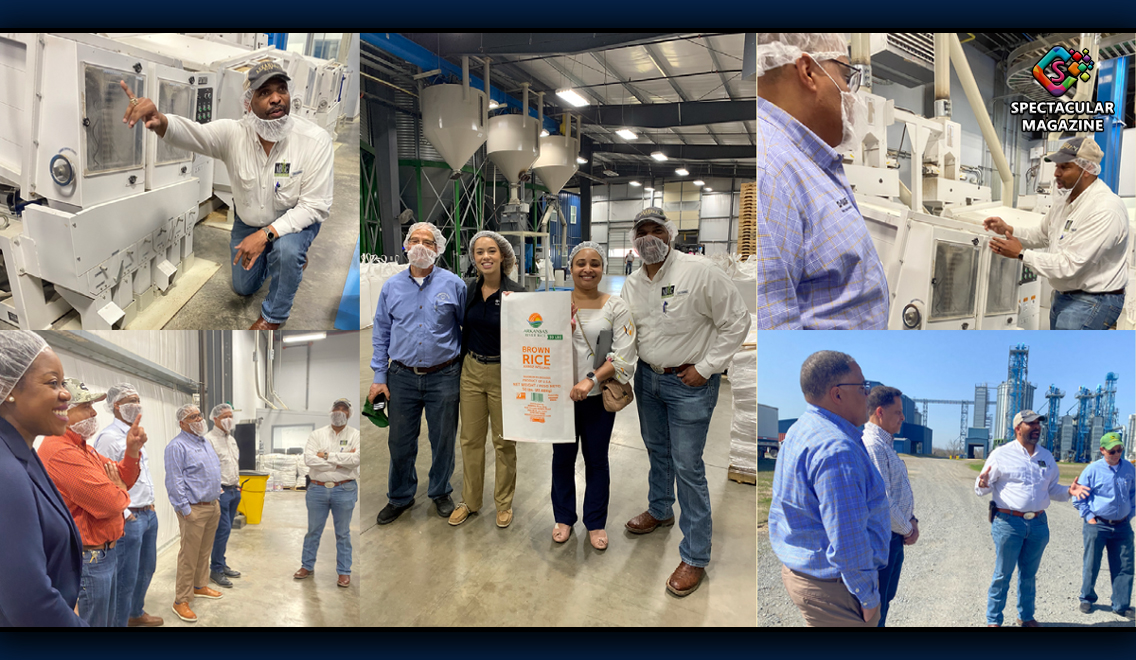BASF Celebrates Black-Owned Rice Mill; Invests In Diversity In Agriculture
RESEARCH TRIANGLE PARK, NC – BASF Agricultural Solutions continues to work towards supporting diversity, equity, and inclusion in agriculture by supporting Black farmers across the country. Recently, several BASF employees visited Arkansas River Rice Mill, the only Black-owned rice mill in the country, to learn more about their operation. The company’s visit also allowed employees to plan for participation in the National Black Growers Council (NBGC) Model Farm Series field days and further company sponsorship in the organization.
Dr. Anna Alicea, Cotton Campaign Manager for BASF says that meeting with owners of this historic mill in the top rice-producing state in the U.S. is an essential step for advancing equity in agriculture.
“In the early 1900’s there were approximately 15 million acres of land owned by African American growers,” said Dr. Alicea. “Visiting this rice mill and experiencing first-hand the lasting legacy and contributions of Black farmers to this industry reaffirms the need to reinvest in all growers, especially those of color.”
The Arkansas River Rice Mill was started by P.J. Haynie, a fifth-generation farmer from Virginia, who wanted to find more diversity in the rice industry. Haynie is also the chairman of the board of the National Black Growers Council which champions the advancement of systemically marginalized farmers.
“We express our sincere appreciation of BASF becoming a sustaining member of NBGC,” said Chairman Haynie. “We are looking forward to BASF and its staff attending and participating in additional NBGC Model Farm Series field days and relative events, as its presence confirms for us and other minority growers, the company’s commitment to supporting the closing of systemic gaps hindering successes of Black growers in American agriculture.”
“NBGC has been promised increased engagement and support from BASF and other companies in tangible ways that could help level the playing field for Black growers,” said Dr. Hazell Reed, NBGC’s Executive Director. Reed also served as Vice Chancellor of the Division of Research and Economic Development at North Carolina Central University (NCCU), former dean of the University of Arkansas at Pine Bluff (UAPB) School of Agriculture, Home Economics and Technology (currently the School of Agriculture, Fisheries and Human Sciences) and was recently appointed to the U.S. Department of Agriculture’s (USDA) Equity Commission.
“This support and engagement we believe will assist in uniting farmers of all backgrounds, as growers give their lives to execute the biggest job on earth,” said Dr. Reed.
Several BASF employees made the trip to tour the Black-owned Arkansas rice mill including Anna Alicea, Leon Troutman, Damien LeBeouf, Frantina Williams, Annie Nsafoah, and Norman Barclift, Director – East Region, Agriculture Solutions.
“BASF knows that Black farmers need parity to meet the needs of a growing world population,” said Barclift. “As the largest chemical company in the world, we want to ensure they have access to timely agronomic insights and product innovations to get the most out of their acres.”
Some of that insight centers around:
- BASF’s offerings of individual business support through its zero percent financing program,
- Diversity and inclusion hiring practices; and
- Education through in-field representatives, available to meet with each grower individually, nationwide.
“Diverse communities and minority-owned enterprises are sources of great innovation and entrepreneurial activity in agriculture, partly out of necessity because they have also been historically underserved by U.S. commercial avenues,” said Brady Spangenberg, Marketing Director of Crop Protection, U.S. Agricultural Solutions Spangenberg. “At BASF, we celebrate the successes of Black farmers and intend to further invest in key areas including but not limited to recruitment and training, technical service/agronomy, and business support.”
About BASF’s Agricultural Solutions division
Farming is fundamental to providing enough healthy and affordable food for a rapidly growing population while reducing environmental impacts. Working with partners and agricultural experts and integrating sustainability criteria into all business decisions, we help farmers to create a positive impact on sustainable agriculture. That’s why we invest in a strong R&D pipeline, connecting innovative thinking with practical action in the field. Our portfolio comprises seeds and specifically selected plant traits, chemical and biological crop protection, solutions for soil management, plant health, pest control, and digital farming. With expert teams in the lab, field, office, and in production, we strive to find the right balance for success – for farmers, agriculture, and future generations. In 2022, our division generated sales of €10.3 billion. For more information, please visit www.agriculture.basf.com or any of BASF’s social media channels.


